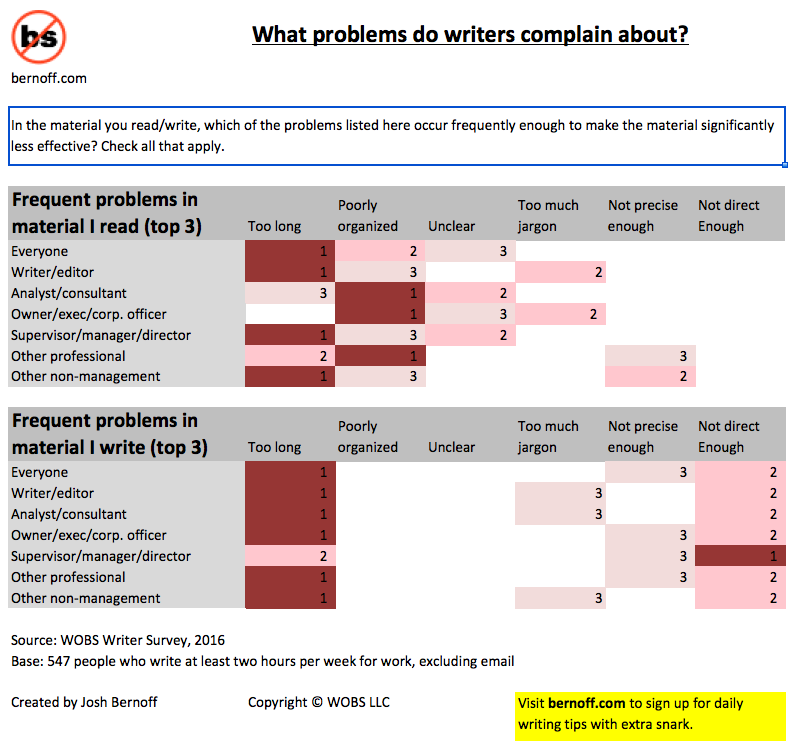Your writing problems are not what you think (Survey Data)
What’s wrong with your writing? If you think it’s too long, you’re probably right. While you may not realize you have organization and clarity problems, your readers do.
Early this year, I surveyed 547 business writers (details below*). This is my first post about the data from that survey. One question I asked was this:
In the material you read (or write), which of the problems listed here occur frequently enough to make the material significantly less effective?
I listed a variety of possible problems including “too long,” “poorly organized,” “too much jargon,” and so on. Respondents could check all answers that applied. I asked the same question both for material people read and material they write.
The table below shows the top 3 responses, both for the whole sample, and for subgroups like writers and editors; analysts and consultants; and supervisors, managers, and directors.

Here’s what I find notable about these results.
- Everyone imagines that bad writing is somebody else’s fault. For example, 65% of respondents said that what they read is poorly organized, but only 16% believe that what they write is poorly organized. The same pattern applied to each problem listed — more people identified it as a problem in what they read than in what they write. As in Lake Woebegon, apparently everyone in my survey is above average.
- Writing too long is a big problem. My post on how to write shorter is popular, which makes sense because there is clearly a problem here. More than 65% of respondents say that what they read is too long — both writers and managers cite it as their top problem. Every group except managers cites it as the biggest writing problem.
- Organization and clarity are bigger issues than you think. Analysts/consultants, owners/executives, and other professionals complain more about poor organization than any other writing problem. They’re also annoyed with a lack of clarity. These are people who need to make decisions and are frustrated that the material they read doesn’t make that easy. Even so, issues with organization and clarity were not among the top three self-identified writing problems of any group in the survey.
- Writers and editors worry about jargon. While 54% of all readers thought jargon was a frequent problem, they were less worried about it than other issues. Only writers, editors, owners, and executives put it in the top three reading problems. Writers, editors, analysts, and consultants admit that it is one of their top three writing problems.
- People think they’re not direct enough. About 44% of supervisors, managers, and directors imagine that their writing is not direct enough; it’s their top issue. It’s number two on the list for everyone else. While 49% of all respondents identify lack of directness as a problem, it’s actually ranked number six as a problem with what people read, behind all the other problems you see in the chart.
Now we have proof that brevity, organization, and clarity issues in what you write are frustrating people more than you think. Reading on a screen is hard.
Writing shorter can help solve many of these problems — you’ll have to compress your arguments, which can help with both organization and clarity. And don’t worry so much about being direct. Worry about being brief and clear, and the reader will perceive you as direct.
* Methodology note: I surveyed 793 people about writing for work in the first three months of 2016. Among those surveys, I identified 547 people who write primarily in English and write at least two hours per week, excluding time spent writing email. I analyzed that sample. All the subgroups that I analyze in this post contain at least 79 respondents, except for “Other non-management,” which has 24.
I recruited people on the withoutbullshit.com blog, on Facebook, and on Twitter, including some people who responded to a promoted tweet on Twitter. Respondents were eligible for a drawing for my book (and as soon as I have one, I’ll send it!) Due to the way I recruited it, this sample is not representative of any group.
Just a copy-edit comment: In your first bullet on this page, you say “Everyone imagines that bad writing is somebody else’s false.” Somebody else’s false, as opposed to your own false? Surely you meant, “Everyone imagines that bad writing is somebody else’s. False.”
Thank. Fixed.